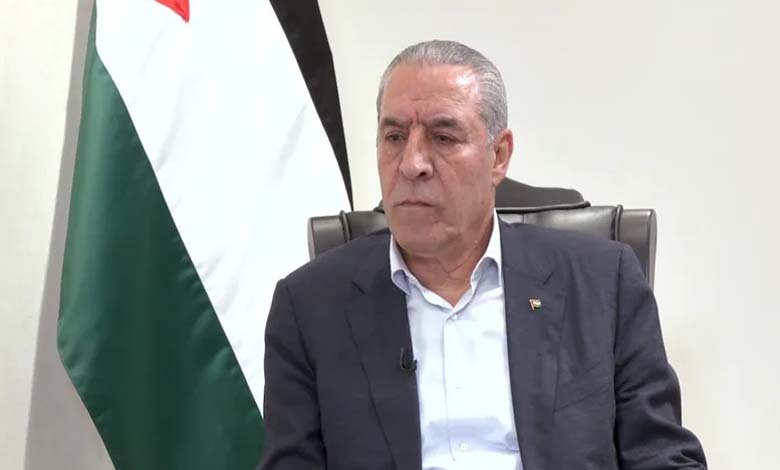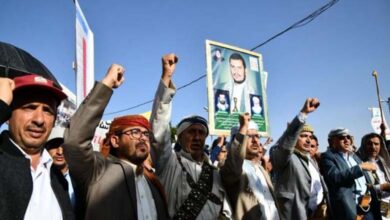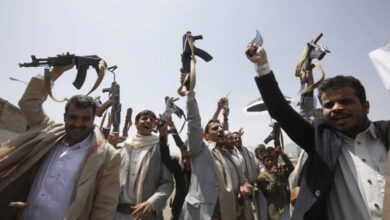The Palestinian Authority pledges to hold Hamas accountable after the end of the war.
Hussein al-Sheikh calls for a comprehensive assessment of everything that has happened since the events of October 7, advocating for a comprehensive national dialogue.

Hussein al-Sheikh, the Secretary-General of the Executive Committee of the Palestine Liberation Organization, stated that all Palestinian factions, including the Islamic Resistance Movement Hamas, should conduct a “comprehensive national assessment of everything that has occurred” after the end of the Israeli war in Gaza. He called for holding the movement accountable amidst the killing and injuring of around 100,000 Palestinians during the recent conflict.
He added, “No one is above accountability and responsibility,” and “there must be a responsible comprehensive Palestinian national dialogue. We should demonstrate responsibility, courage, face ourselves candidly and responsibly, without hesitation. No one is above criticism.”
The 63-year-old al-Sheikh further mentioned that the war that unfolded in Gaza after the October 7th attacks on southern Israel means that “no one is above accountability or that there is an isolated person. Therefore, there must be a comprehensive Palestinian national assessment of everything that has happened and will happen in the future.”
According to Israel, Hamas‘s attacks led to the killing of 1,200 Israelis, resulting in relentless bombing and ground warfare, leading to the deaths of over 19,000 Palestinians and displacing hundreds of thousands, turning many parts of the Gaza Strip into rubble.
Some consider al-Sheikh a potential successor to Palestinian President Mahmoud Abbas. These statements mark the first time a senior leader in the Palestine Liberation Organization publicly discusses Hamas‘s tactics since the October 7th attacks.
Al-Sheikh acknowledged that the political path under the Oslo Peace Accords is stumbling and “has not achieved its goal so far” and will not achieve the Palestinian people’s aspirations for the establishment of a Palestinian state within the borders pre-dating the 1967 war in its current form.
He, along with Abbas, met with U.S. National Security Advisor Jake Sullivan in Ramallah on Friday. Al-Sheikh stated that Palestinians informed Sullivan of the need for a new international effort to persuade Israel to achieve a comprehensive solution including the West Bank, Gaza, and East Jerusalem.
On Saturday, in a rare interview held in an elegant office adorned with pictures of Abbas and his predecessor Yasser Arafat in the occupied West Bank city of Ramallah, al-Sheikh said that there must be a single government managing the Palestinian homeland.
It is known that the West Bank is cut off by an Israeli wall and fence that snakes for hundreds of kilometers across the hills. Jewish settlers have expanded construction in areas that are expected to be part of the future Palestinian state in recent years.
Most countries consider Jewish settlements built on the lands occupied by Israel in the 1967 war as illegal.
Al-Sheikh said that despite verbal support, which is welcomed, for a Palestinian state in meetings, Washington has not proposed concrete mechanisms or political initiatives. He reiterated Abbas‘s call for an international peace conference to chart a new course.
A senior U.S. official said this week that the idea of holding a conference had been discussed with partners, but the proposal is still in its early stages.
U.S. President Joe Biden sent a series of top U.S. officials to the West Bank to meet with Abbas and al-Sheikh in an effort to renew the faltering Palestinian Authority’s responsibility for Gaza after the war and unify the administration of the sector and the West Bank.
The visiting U.S. officials discussed the need for reforms to combat corruption, hand over broader executive powers to the prime minister, and introduce fresh blood into the Palestinian Authority.
Despite U.S. efforts, Israeli Prime Minister Benjamin Netanyahu said on Friday that he would not allow the Palestinian Authority to manage Gaza after the war and indicated that Israel would occupy the sector instead.
Al-Sheikh stated that the Palestinian Authority is the legitimate representative of the Palestinian people and would be ready to take over the administration of Gaza after the war. However, he acknowledged the need to reassess the Palestinian Authority’s role.
The Palestinian Authority is not popular among many Palestinians, who consider it corrupt, undemocratic, and detached from reality. In contrast, a recent Palestinian opinion poll showed an increase in Hamas‘s popularity in both Gaza and the West Bank since its attacks.
Referring to Hamas, which has engaged in five wars against Israel since 2008, Al-Sheikh said, “Some should not think that their way and method in managing the conflict with Israel was optimal and the best.”
He added that after this number of casualties and after everything that happened, “does it not deserve all this and everything that is happening that we conduct a serious, sincere, and responsible assessment to protect our people and our cause?”
Continuing, he asked, “Does it not deserve all this that we discuss how to manage this conflict with Israeli occupation?”
Al-Sheikh said that 60% of Gaza has been destroyed, and the reconstruction will cost $40 billion over decades. He added that the Oslo Peace Accords with Israel in 1993 were partially successful because they gave Palestinians an identity and led to the return of two million refugees to the West Bank and Gaza from the countries they fled to during the 1948 and 1967 wars with Israel.
He said that Israeli military incursions and settlement expansion weakened the Palestinian Authority.
Abbas elevated al-Sheikh last year, and his new role effectively made him the second most powerful man in the Palestine Liberation Organization, an umbrella for non-Islamic Palestinian factions that do not include Hamas.
Al-Sheikh is not very popular among Palestinians, partially due to his role in communicating with the Israeli occupying army. Opinion polls give him around three percent approval.
Responding to a request for comment, Hamas official Sami Abu Zuhri said that al-Sheikh stands with the Israeli civil administration, and his attack on Palestinian resistance is not surprising. Al-Sheikh stated that his job is to work with Israel to alleviate the suffering of Palestinians.












